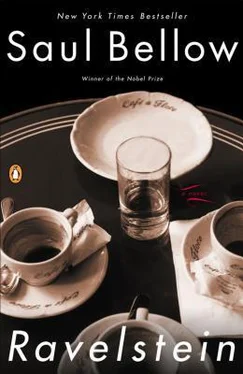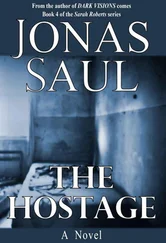Rosamund would only say, "If you did no more than this Phi Beta Kappa sketch it would cheer Ravelstein in the afterlife."
And my answer to this was, "Ravelstein didn't believe in an afterlife. And if he does exist somewhere, what possible pleasure could it give him to remember his dumbhead father or any part of what we call our mortal span? I'm the one who imagines seeing the dead parents on the other side. And brothers, friends, cousins, aunts and uncles…"
Rosamund often nodded. She admitted that she had a similar tendency. She sometimes added, "I ask myself what they're doing in the life-to-come."
"If you could take a poll on the subject you'd find that a majority of us expect to see their dead, whom they loved and continue to love-the very people they had, now and then, cheated and sometimes despised or hated or habitually lied to. Not you, Rosamund, you're exceptionally honest. But even Ravelstein, a man who was too hard to have such illusions, said… He gave himself away when he told me that of all the people close to him I was the likeliest to follow him soon-to follow him _where__? Would I catch up with him, and would we see each other?"
"You can't build too much on remarks like that," said Rosamund.
"It's easy enough to argue that childish love is the source of these illusions. This is my way of admitting that half a century later I feel I haven't seen the last of my mother. Freud would have trashed this as sentimental and inane. But Freud was a doctor, and nineteenth-century doctors were rough on the sentiments. They'd say the human being represented chemical components worth about sixty-two cents-they were severe rationalists and tough guys."
"But Ravelstein was far from simpleminded," said Rosamund.
"Of course he was. But let's go a step or two further-I'll let you in on a kinky thought. I wonder what might happen. If I were to write my memoir of Ravelstein there would be no barrier between death and me."
Rosamund laughed outright at this. "Do you mean that your du ties would end, and there would be no reason to live on? ' "No, no. Luckily I'd still have you to live for, Rosamund. What I'm probably trying to say is that in Ravelstein's view I may have nothing more to do in this life than to commemorate him."
"That is an odd thought for anyone to have."
"He felt he was giving me a great subject-the subject of subjects. And that is an odd thought. But I've never assumed that I was a rational, modern person. A rational person wouldn't be meeting his dead in the gloaming-wherever the gloaming is."
"All the same," said Rosamund, "the fact that it's so persistent makes it something to reckon with."
"And why me? In less than a minute I can name five people better qualified."
"About his ideas, yes," said Rosamund. "But they mightn't have the color to put into it. Also-you two became friends late in life and, as a rule, older people don't form such attachments…."
Perhaps she meant, also, that the old didn't fall in love. They weren't apt to blunder into the magnetic field where they had no business to be.
"For a year or two Ravelstein kept after me because Vela and I saw Radu Grielescu and his wife so often," I said to Rosamund.
"They entertained you?"
"They took us to good restaurants-the most expensive ones, anyway. Vela loved all the hand-kissing, bowing, fussing over the ladies, the corsages, and the toasting. She was terribly pleased. Grielescu put on such a show. Ravelstein was extremely curious about those evenings. He said that Radu had belonged to the Iron Guard. I paid no particular attention to this. I didn't get the drift, and that bothered Ravelstein."
"You didn't spot him for a Nazi?" Rosamund said.
"Ravelstein went a step further and told me that Grielescu about ten years ago had been scheduled to lecture in Jerusalem but that the invitation was canceled. Somehow even this didn't register with me. I must have been too busy to put it together. I do shut off my receptors sometimes and decide, somehow, not to see what there is to be seen. Ravelstein noticed that, naturally. I was the one who failed to notice.
"Ravelstein wanted to know just what Grielescu's line was like and I told him that at dinner he lectured about archaic history, he stuffed his pipe, and lit lots of matches. You grip your pipe to keep it from shaking, and then the fingers with the match tremble twice as hard. He kept stuffing the pipe with the rebellious tobacco. When it didn't stay stuffed, he didn't have enough thumb-power to pack it down. How could such a person be politically dangerous? His jacket cuffs come down over his knuckles."
Rosamund said, "My guess is that being seen in public with you was worth a lot to Grielescu. But this is how you do things, Chick: the observations you make crowd out the main point."
"That's exactly what Ravelstein eventually told me. And how curious it was that I let myself be used like that."
"You wanted to please your wife. You wanted her good opinion. And Ravelstein probably felt that you were letting yourself be conned. Taking the easy way out..
"I suppose I said to myself that this was some Frenchy-Balkan absurdity. Somehow I couldn't take Balkan fascists seriously. When the check came, Radu sprang out of his chair to grab it. It became a game that I never once get the tab. And one of the things that got me was how he always paid with clean, unwrinkled, fresh-from-the-bank currency, and he never seemed to look at the amount of the bill. If you grew up in the Depression, you wouldn't miss such a thing."
"And you entertained Ravelstein with your descriptions."
"I tried to. But he waved away the pipes and mannerisms. He was waiting for me to come out of the fog."
"Well, you were his appointed biographer. That you were slow on the uptake couldn't have pleased him."
"Of course not. When he told me that Radu's invitation to Jerusalem had been canceled I didn't even ask for the particulars. I see that I missed the boat."
"Well, when he chose you to write about him he didn't think you had no faults," said Rosamund.
"About the basics we agreed as closely as we could, considering my ignorance," I told her. "He had the support of the classics. I certainly did not, but when I was wrong I didn't put my energy where my errors were. I learned later in life how foolish it was to insist that you had been right."
"You needed to be right and you couldn't get by and be right, also," said Rosamund.
"Vela's plan was that Grielescu should replace Ravelstein. In Paris, when Abe rushed into our room and surprised her in her slip, she ran for the bathroom-she had a strange way of running, hippity-hop on her tiptoes-and she locked the door. Then the time came when she told me we couldn't see Ravelstein anymore."
"That was very odd," said Rosamund. In speaking of Vela she was always proper and circumspect. "Was this when Vela sent for her mother? Did she bring her to Paris?"
"No, no. The old girl had died a couple years before this. Your hunch is right, though. She relied on her mother to cover the-what should I call them-the human relations. She had no such skills herself. Anyway, the old girl loathed me. Having a Jewish son-in-law poisoned her old age."
"Now you've put your finger on the real subject," said Rosamund.
"You've given lots of thought to all kinds of problems, except the most important one. You began with the Jewish question," she said.
"Of course that's what this conversation is circling-what it means to the Jews that so many others, millions of others, willed their death. The rest of humankind expelled them. Hitler was on record as having said that once he was in power he would have gal lows, in rows, put up at the Marienplatz in Munich and the Jews, to the last Jew, would be hung there. It was the Jews that were Hitler's ticket to power. He didn't have, nor did he need, any other program. He became Chancellor by uniting Germany and much of the rest of Europe against the Jews. Anyway, insofar as this relates to Grielescu, I don't think he was a malevolent Jew-hater, but when he was called upon to declare himself, he declared himself. He had a vote and he voted. As Ravelstein saw it I refused to do the unpleasant work of thinking it all through."
Читать дальше












